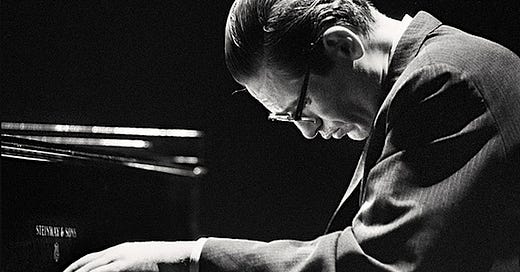There was a time when I didn’t listen to jazz. I know, crazy, huh?
Well, it is for jazz lovers, something I became after a friend introduced me to it. I grew up on rock ‘n’ roll, and unfortunately, my early adult life didn’t offer opportunities to experience much else.
Neither did my childhood. We weren’t a musical family and didn’t attend concerts. I learned all the usual tunes as a kid (i.e., Twinkle, Twinkle, Little Star, etc.) The other type was gospel music, thanks to my maternal grandmother, who took us to church on Sunday mornings.
In the beginning, I was amazed at the variety and range of styles jazz offered. From rough and edgy to soulful and warm, it became a favorite genre of mine. I lean more toward cool, smooth, and Blues, but I enjoy all types depending on my mood.
A Brief History
Today, I’m listening to Bill Evans, considered one of the most important and influential jazz pianists of his generation. In case you’ve never heard of him, let me introduce you!
Born in 1929 in New Jersey, he was classically trained on the piano by his mother starting at age six. He also studied the violin and flute.
Despite being best known for his jazz contributions, Evan’s command over classical music greatly influenced his improvisational style.

In 1950, Evans graduated from Southwestern Louisiana University with a degree in piano performance. He had been an accomplished pianist from a young age and won several competitions during his college years.
Afterward, he was drafted during the Korean War and spent three years playing the flute, piccolo, and piano in the Fifth Army Band at Fort Sheridan in Illinois.
Despite his exceptional talent Evans initially struggled to find success in the music industry, leading to low-paying, menial jobs.
Eventually, he found that success, joining Miles Davis’s band in 1958. They recorded Kind of Blue, one of the most popular jazz albums of all time. The group included saxophonists John Coltrane and “Cannonball” Adderley, bassist Paul Chambers, and drummer Jimmy Cobb.
It’s not just what you play, but how you play it. ~Bill Evans
Evans went on to form his own trio and often worked in small groups while remaining an innovative solo player.
Unfortunately, like so many creatives, he was plagued with drug use. During the 1960s, Evans was addicted to heroin, which he overcame with the help of methadone. After recovering, he enjoyed a resurgence in 1971 with The Bill Evans Album.
But he had his share of tragedy. His long-time girlfriend committed suicide some years earlier, and his beloved brother, Harry, who suffered from schizophrenia, also committed suicide.
Sadly, Evans, once again, became addicted, this time to cocaine, and died in 1980 at 51 years old.
Bill Evans was known for his highly nuanced touch, the clarity of his music's feeling content, and his reform of the chord voicing system pianists used. His playing style has romantic qualities that contrast with the bebop of the 1950s.
Some of you may be familiar with Evans, while others may not. If you enjoy piano music, give it a listen and let me know what you think in the comments.
Thanks for reading Life Matters!
SUBSCRIBE to receive weekly ‘bite-sized’ posts that offer information and inspiration in under 10 minutes:
If you enjoyed the post, please LIKE/SHARE/and COMMENT:
Life Matters is a reader-sponsored publication (No ads or affiliate links). Please consider supporting my efforts with a one-time tip OR upgrade to the paid membership for additional benefits:






I love jazz music and I think this was article did a great job at offering direction to newbies and lovers of the genre alike. I’ll be checking him out very soon!
There's something about the sound of a piano in a jazz ensemble that says, "The world is alright."